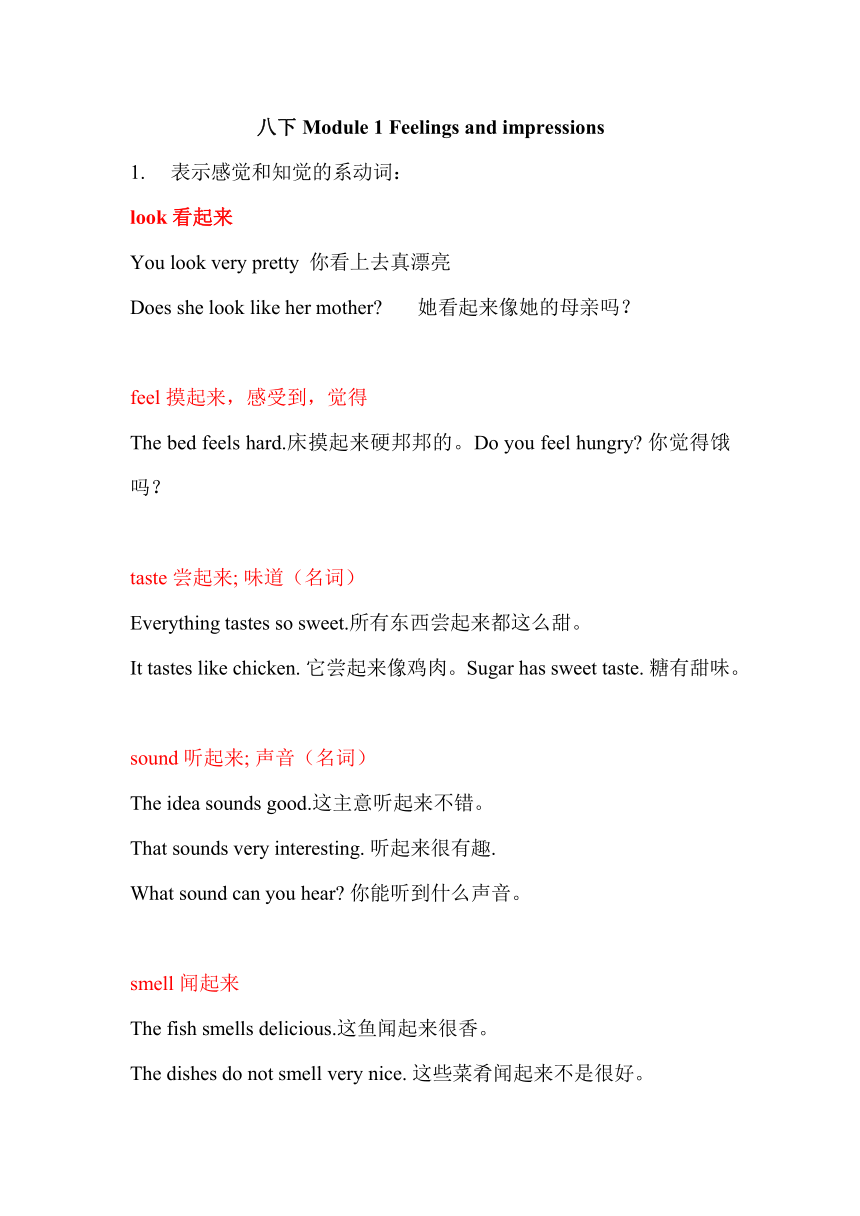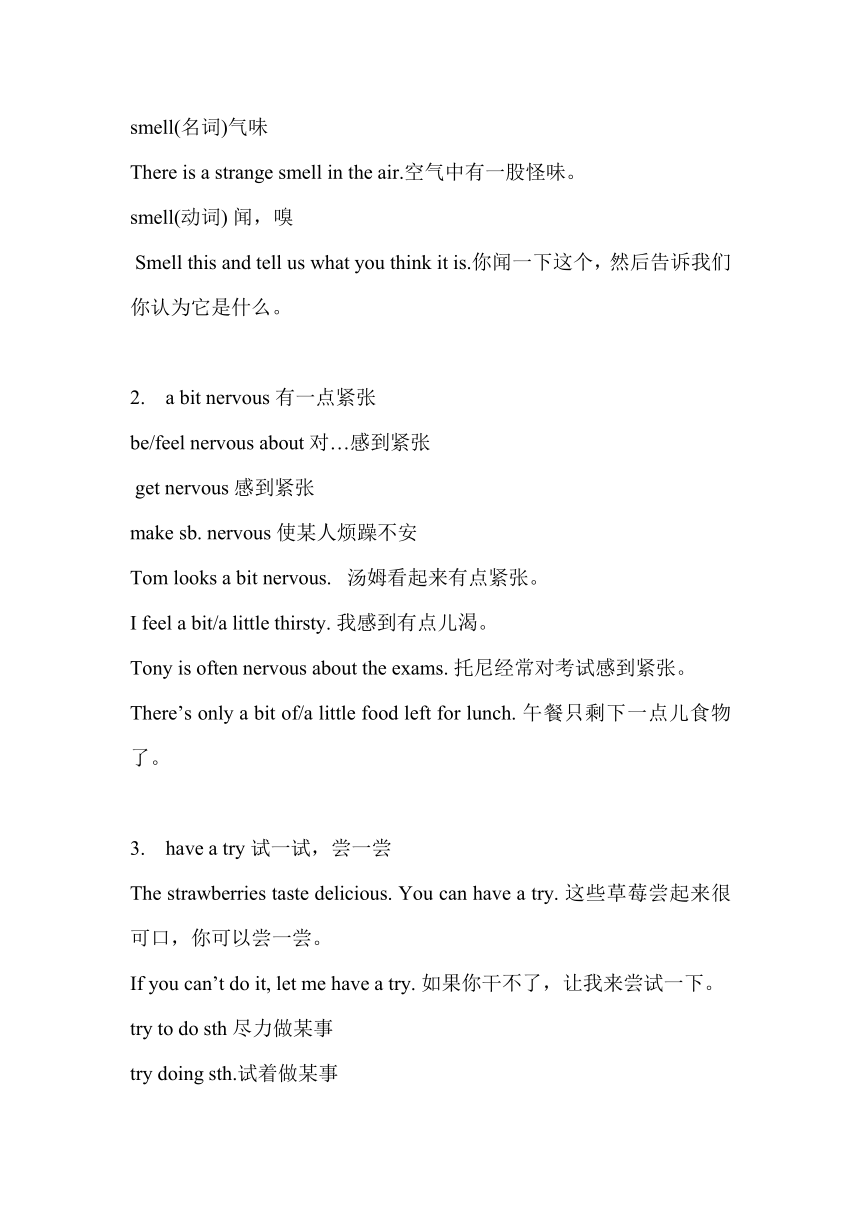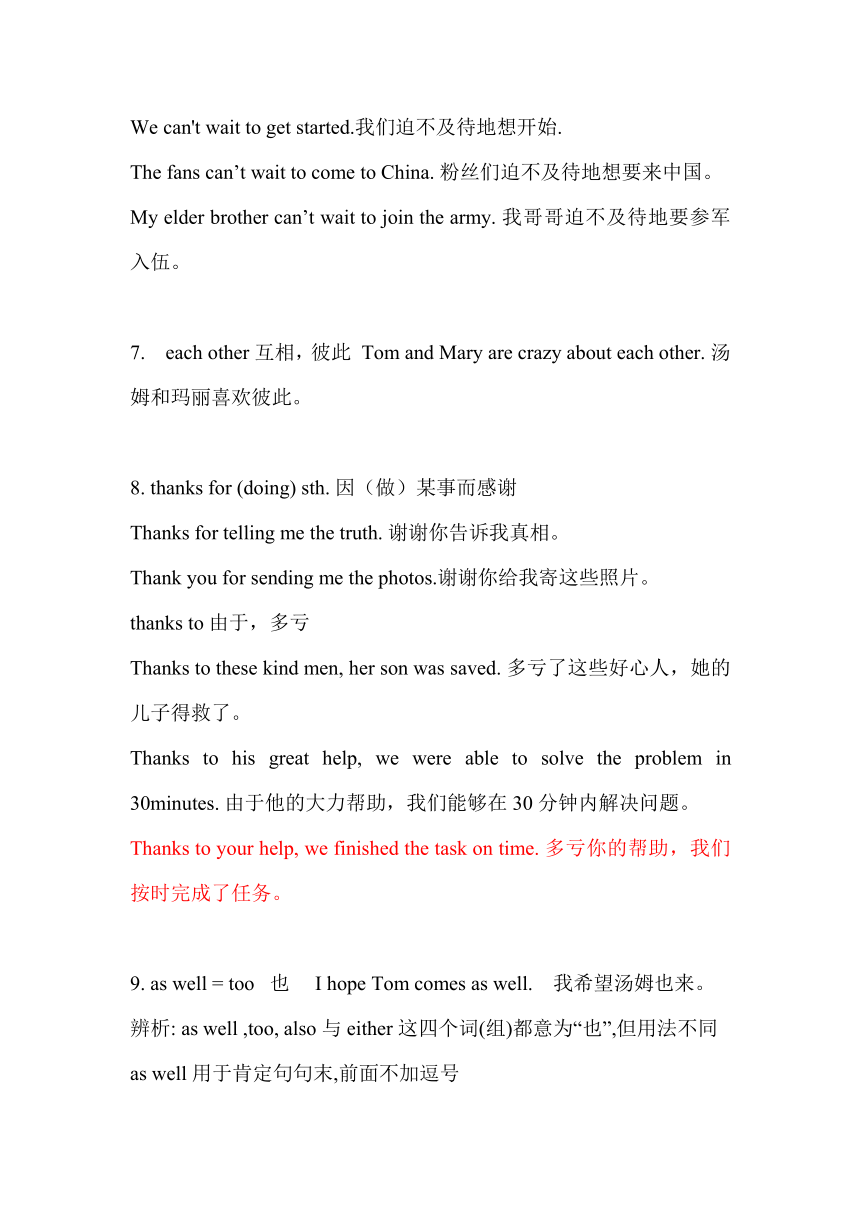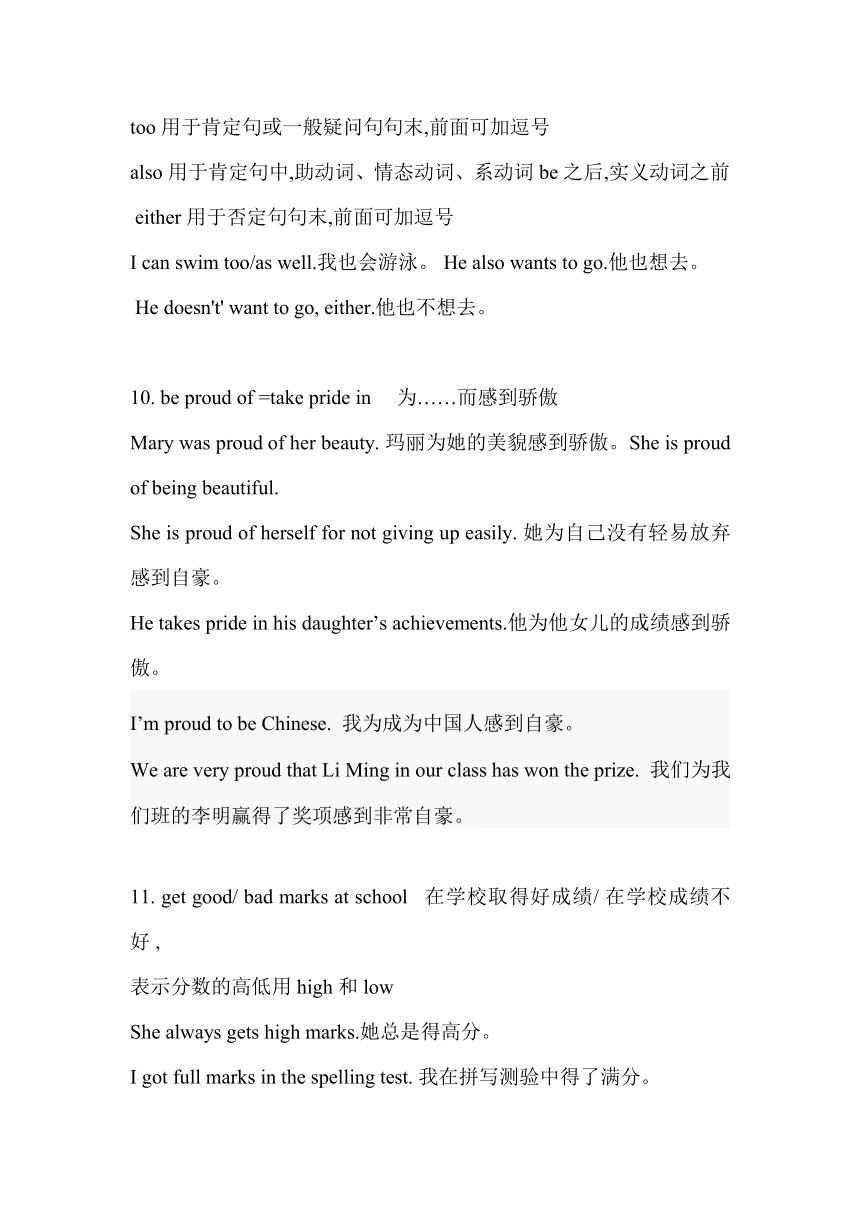八下Module 1 Feelings and impressions同步学案
文档属性
| 名称 | 八下Module 1 Feelings and impressions同步学案 |

|
|
| 格式 | docx | ||
| 文件大小 | 28.9KB | ||
| 资源类型 | 教案 | ||
| 版本资源 | 外研版 | ||
| 科目 | 英语 | ||
| 更新时间 | 2024-11-01 00:00:00 | ||
图片预览





文档简介
八下Module 1 Feelings and impressions
1. 表示感觉和知觉的系动词:
look看起来
You look very pretty 你看上去真漂亮
Does she look like her mother 她看起来像她的母亲吗?
feel摸起来,感受到,觉得
The bed feels hard.床摸起来硬邦邦的。Do you feel hungry 你觉得饿吗?
taste 尝起来; 味道(名词)
Everything tastes so sweet.所有东西尝起来都这么甜。
It tastes like chicken. 它尝起来像鸡肉。Sugar has sweet taste. 糖有甜味。
sound听起来; 声音(名词)
The idea sounds good.这主意听起来不错。
That sounds very interesting. 听起来很有趣.
What sound can you hear 你能听到什么声音。
smell闻起来
The fish smells delicious.这鱼闻起来很香。
The dishes do not smell very nice. 这些菜肴闻起来不是很好。
smell(名词)气味
There is a strange smell in the air.空气中有一股怪味。
smell(动词) 闻,嗅
Smell this and tell us what you think it is.你闻一下这个,然后告诉我们你认为它是什么。
2. a bit nervous 有一点紧张
be/feel nervous about对…感到紧张
get nervous 感到紧张
make sb. nervous 使某人烦躁不安
Tom looks a bit nervous. 汤姆看起来有点紧张。
I feel a bit/a little thirsty. 我感到有点儿渴。
Tony is often nervous about the exams. 托尼经常对考试感到紧张。
There’s only a bit of/a little food left for lunch. 午餐只剩下一点儿食物了。
3. have a try 试一试,尝一尝
The strawberries taste delicious. You can have a try. 这些草莓尝起来很可口,你可以尝一尝。
If you can’t do it, let me have a try. 如果你干不了,让我来尝试一下。
try to do sth 尽力做某事
try doing sth.试着做某事
try one's' best to do sth.尽某人最大努力做某事
try on试穿
We must try to keep calm. 我们必须努力保持冷静。
You may try using your new computer. 你可以试着用你的新电脑。
We should try our best to protect the environment.我们应该尽最大努力保护环境。
Try on your shoes to make sure they fit试穿一下你的鞋子,确保它们合适。
The old woman tried to see her daughter every day, so she tried living in several places.
每天这位老太太尽力见到她的女儿,因此她试着在几个地方居住。
I’ll try doing it in a new way. 我将试着用一种新方法来做这一件事。
4. have a sweet tooth 爱好甜食 I always have a sweet tooth. 我一直喜欢吃甜食。
sweet 还有“糖果”的意思。 I bought two kilos of sweets. 我买了两千克糖果。
5. hear from sb.= get / receive a letter from sb. 收到某人的来信
I heard from him last month. 我上个月收到了他的来信。
6. can’t wait to do sth. 迫不及待去做某事
We can't wait to get started.我们迫不及待地想开始.
The fans can’t wait to come to China. 粉丝们迫不及待地想要来中国。
My elder brother can’t wait to join the army. 我哥哥迫不及待地要参军入伍。
7. each other互相,彼此 Tom and Mary are crazy about each other. 汤姆和玛丽喜欢彼此。
8. thanks for (doing) sth. 因(做)某事而感谢
Thanks for telling me the truth. 谢谢你告诉我真相。
Thank you for sending me the photos.谢谢你给我寄这些照片。
thanks to 由于,多亏
Thanks to these kind men, her son was saved. 多亏了这些好心人,她的儿子得救了。
Thanks to his great help, we were able to solve the problem in 30minutes. 由于他的大力帮助,我们能够在30分钟内解决问题。
Thanks to your help, we finished the task on time. 多亏你的帮助,我们按时完成了任务。
9. as well = too 也 I hope Tom comes as well. 我希望汤姆也来。
辨析: as well ,too, also与 either这四个词(组)都意为“也”,但用法不同
as well用于肯定句句末,前面不加逗号
too用于肯定句或一般疑问句句末,前面可加逗号
also用于肯定句中,助动词、情态动词、系动词be之后,实义动词之前
either用于否定句句末,前面可加逗号
I can swim too/as well.我也会游泳。 He also wants to go.他也想去。
He doesn't' want to go, either.他也不想去。
10. be proud of =take pride in 为……而感到骄傲
Mary was proud of her beauty. 玛丽为她的美貌感到骄傲。She is proud of being beautiful.
She is proud of herself for not giving up easily. 她为自己没有轻易放弃感到自豪。
He takes pride in his daughter’s achievements.他为他女儿的成绩感到骄傲。
I’m proud to be Chinese. 我为成为中国人感到自豪。
We are very proud that Li Ming in our class has won the prize. 我们为我们班的李明赢得了奖项感到非常自豪。
11. get good/ bad marks at school 在学校取得好成绩/ 在学校成绩不好 ,
表示分数的高低用high和low
She always gets high marks.她总是得高分。
I got full marks in the spelling test. 我在拼写测验中得了满分。
mark 还可以作名词“记号”。I made a mark on the wall. 我在墙上做了个记号。
get a good score 取得好成绩 a high score/low score 高分/低分 score a goal 进球得分
You should work hard if you want to get a good score.如果你想取得好成绩,你应该努力学习。
Our team scored two goals at last. 最后我们队进了两个球。
He scored 85 on the exam. 他在考试中得了85分。
12. How do you feel about(doing) sth. … 关于…….你的感觉怎么样?/
询问对方对某人或某事看法的句型还有:What do you think of… 和How do you like…
How do you feel about living in Japan 你对住在日本的感觉怎么样?
How do you feel about leaving your parents 离开你父母你有什么感觉?
13. in a few days 在(未来的)几天之后
The next meeting will take place in a few days. 下次会议将在几天内举行。
in the right way 用合适的/正确的方式
14. I’m afraid (that)…恐怕……可用来表示推测、歉意、礼貌地拒绝或者引出不好的消息。
I'm afraid I can't go to your birthday party. 恐怕我不能去参加你的生日聚会。
Gina, could you please play the drums on the art festival 吉娜,你能在艺术节上打鼓吗
-I'm afraid I can't. I can only play the guitar.恐怕我不能。我只会弹吉他。
I’m afraid so.恐怕是这样。 I’m afraid not. 恐怕不是这样。
-Would you like to play football after school 放学后你想踢足球吗?
-I’m afraid not. I have a lot of homework to do. 恐怕不能。我有很多作业要做。
be afraid of doing sth= be afraid to do sth 害怕做某事
I'm afraid of going out alone at night.我害怕夜间独自外出。
Daming is afraid to speak English in class.大明害怕在课堂上说英语。
[拓展] be afraid of sb./sth.害怕某人/某物
The birds were not afraid of my dog at all.那些鸟一点儿也不害怕我的狗。
15. be done 做好了,完成了
My homework is done now. 我的家庭作业现在完成了。The beds are done. 床铺都整理好了。
16. Shall I do sth. 我来做某事好吗?常用于说话人主动提出做某事,尤其是主动提供帮助时
Shall I get some water for you 我去给你弄点儿水吧?
Shall we do sth. 我们做某事好吗 用来提出建议,回答时可用“Good idea.”或“Sounds great.”等表示赞同。Shall we go camping to celebrate our graduation 我们去野营来庆祝我们毕业好吗
17. for(介词〕①用于表示用途。The knife is for cutting paper这把刀子是用来裁纸的。
②为了表示目的。What did you do that for 你那样做是为了什么
③计,达。表示距离或持续的时间。
We walked for miles.我们走了好几英里。I' ll be here for 2 months.我将在这里待两个月。
④当作表示食物在哪一餐吃。We usually have pizza for lunch. 午餐我们通常吃比萨饼。
⑤给,对表示对象。I have a present for you. 我有件礼物要送给你。
18. be/get excited about sth. 对某事感兴趣
be excited to do sth.=be/get excited about doing sth. 对做某事感到兴奋
She was really excited about going to Beijing. 她对去北京感到非常兴奋。
19. lucky 幸运的 luckily(副词)幸运地 unlucky 不幸的 unluckily 不幸地
I am lucky to have a friend like you. 我很幸运能有像你这样的朋友。
You are a lucky dog. 你是个幸运儿!
Luckily, Tom was wearing his seat belt. 幸运的是,汤姆戴着安全带。
20. at school 在上学 at the school 在学校里,强调的是地点,不是指上学
All my children are still at school. 我的孩子都还在上学。
Let’s meet at the school. 咱们在学校里碰面吧。
21.情态动词总结:
1).must 必须 ;表示推测时意为“一定,肯定” mustn’t 表示禁止
I must go now, or I’ll miss my train. 我必须得走了,否则,我将错过我的火车。
He must be out because his room is dark. 他肯定出去了,因为他的房间是暗的。
-Can we walk across the road now 我们现在能过马路吗?
-No, we mustn’t. We have to wait until the light turns green. 不能,我们必须等到交通信号灯变绿。
2) need 需要 needn’t 不必
-Need I answer the question 我需要回答那个问题吗
-Yes, you must/have to. No,you needn''t是的,你必须回答。不,不必了。
另外,need还可以作实义动词。
We need to learn a lot of things in our youth.我们年轻时需要学习很多东西。
3). can 和could
4). may 和might
22. favourite①[可数名词〕最喜欢的人或事
These toys are great favorites to the children. 孩子们特别喜欢这些玩具。
②(形容词最喜欢的通常位于名词前作定语。
It's one of my favourite movies.这是我最喜欢的电影之一。
23.message(可数名词]电子邮件;口信;信息
常见短语有: take a message 捎个口信 leave a message留言
send a message发信息
get/receive a message收到信息
I often write messages to my pen friend.我经常给我的笔友写电子邮件。
Could you take a message for Tom, please 请你帮汤姆捎个口信,好吗
24. fair(形容词〕①(头发)金色的,浅褐色的 She has long fair hair.她有一头金色长发。
②(天气)晴朗的 a fair sky晴朗的天空
③公平的;公正的 You must be fair to both sides.你必须公平对待双方
25. What does sb./sth. look like 询问某人/物的外貌。
What is sb./sth like 通常询问某人/物的性格和内在特征。
-What does Mary look like 玛丽长什么样子?-She is tall with short hair. 她个子很高,留着短发。
-What’s Tom like 汤姆是个什么样的人?-He’s very shy. 他很害羞。
-What does he like 他喜欢什么。(回答:He likes swimming.)
26. help sb. with sth = help sb (to) do sth. 帮助某人做某事
I often help him with his maths. =I often help him (to)learn maths.我经常帮他学习数学。
How often do you help your mother with the housework 你多久帮母亲做一次家务
[拓展]help〔名词〕帮助with sb.'s help(=with the help of sb.)在某人的帮助下
With our teacher's help, I've made great progress. 在老师的帮助下,我取得了很大进步。
27. quite与very辨析
quite+a(n)+形容词+单数可数名词, quite修饰动词时放在动词之前。
He is quite a nice boy=He is a very nice boy. 他是一个很不错的男孩。
He quite likes maths.=He likes maths very much. 他非常喜欢数学。
28. would like的用法:
I’d like a bottle of water. 我想要一瓶水。
We’d like to go to the zoo. 我们想去动物园。
I’d like you to help me. 我想让你帮我。
Would you like some bread 你想要一些面包吗?
29. else 别的,其他的
Do you have anything else to say 你还有别的事情要说吗?
Who else do you know here 你还认识这里的其他人吗?
What other things do you need 你还需要什么东西?
else 作形容词时一般用来修饰不定代词,并放在不定代词的后面,也可以修饰疑问代词并放在其后。
other 用来修饰名词,通常放在名词之前。
32. open 坦诚的,坦率的
be open with sb. 对某人坦诚
be open about sth. 对某事坦诚
In the West, people are quite open about their feelings.
I’m always open with my parents. 我与我父母总是无话不谈。
He is quite open about his plan. 他对于自己的计划相当坦诚。
The couple are open with each other about their emotions. 这对夫妇对彼此的感情都很坦率。
1. 表示感觉和知觉的系动词:
look看起来
You look very pretty 你看上去真漂亮
Does she look like her mother 她看起来像她的母亲吗?
feel摸起来,感受到,觉得
The bed feels hard.床摸起来硬邦邦的。Do you feel hungry 你觉得饿吗?
taste 尝起来; 味道(名词)
Everything tastes so sweet.所有东西尝起来都这么甜。
It tastes like chicken. 它尝起来像鸡肉。Sugar has sweet taste. 糖有甜味。
sound听起来; 声音(名词)
The idea sounds good.这主意听起来不错。
That sounds very interesting. 听起来很有趣.
What sound can you hear 你能听到什么声音。
smell闻起来
The fish smells delicious.这鱼闻起来很香。
The dishes do not smell very nice. 这些菜肴闻起来不是很好。
smell(名词)气味
There is a strange smell in the air.空气中有一股怪味。
smell(动词) 闻,嗅
Smell this and tell us what you think it is.你闻一下这个,然后告诉我们你认为它是什么。
2. a bit nervous 有一点紧张
be/feel nervous about对…感到紧张
get nervous 感到紧张
make sb. nervous 使某人烦躁不安
Tom looks a bit nervous. 汤姆看起来有点紧张。
I feel a bit/a little thirsty. 我感到有点儿渴。
Tony is often nervous about the exams. 托尼经常对考试感到紧张。
There’s only a bit of/a little food left for lunch. 午餐只剩下一点儿食物了。
3. have a try 试一试,尝一尝
The strawberries taste delicious. You can have a try. 这些草莓尝起来很可口,你可以尝一尝。
If you can’t do it, let me have a try. 如果你干不了,让我来尝试一下。
try to do sth 尽力做某事
try doing sth.试着做某事
try one's' best to do sth.尽某人最大努力做某事
try on试穿
We must try to keep calm. 我们必须努力保持冷静。
You may try using your new computer. 你可以试着用你的新电脑。
We should try our best to protect the environment.我们应该尽最大努力保护环境。
Try on your shoes to make sure they fit试穿一下你的鞋子,确保它们合适。
The old woman tried to see her daughter every day, so she tried living in several places.
每天这位老太太尽力见到她的女儿,因此她试着在几个地方居住。
I’ll try doing it in a new way. 我将试着用一种新方法来做这一件事。
4. have a sweet tooth 爱好甜食 I always have a sweet tooth. 我一直喜欢吃甜食。
sweet 还有“糖果”的意思。 I bought two kilos of sweets. 我买了两千克糖果。
5. hear from sb.= get / receive a letter from sb. 收到某人的来信
I heard from him last month. 我上个月收到了他的来信。
6. can’t wait to do sth. 迫不及待去做某事
We can't wait to get started.我们迫不及待地想开始.
The fans can’t wait to come to China. 粉丝们迫不及待地想要来中国。
My elder brother can’t wait to join the army. 我哥哥迫不及待地要参军入伍。
7. each other互相,彼此 Tom and Mary are crazy about each other. 汤姆和玛丽喜欢彼此。
8. thanks for (doing) sth. 因(做)某事而感谢
Thanks for telling me the truth. 谢谢你告诉我真相。
Thank you for sending me the photos.谢谢你给我寄这些照片。
thanks to 由于,多亏
Thanks to these kind men, her son was saved. 多亏了这些好心人,她的儿子得救了。
Thanks to his great help, we were able to solve the problem in 30minutes. 由于他的大力帮助,我们能够在30分钟内解决问题。
Thanks to your help, we finished the task on time. 多亏你的帮助,我们按时完成了任务。
9. as well = too 也 I hope Tom comes as well. 我希望汤姆也来。
辨析: as well ,too, also与 either这四个词(组)都意为“也”,但用法不同
as well用于肯定句句末,前面不加逗号
too用于肯定句或一般疑问句句末,前面可加逗号
also用于肯定句中,助动词、情态动词、系动词be之后,实义动词之前
either用于否定句句末,前面可加逗号
I can swim too/as well.我也会游泳。 He also wants to go.他也想去。
He doesn't' want to go, either.他也不想去。
10. be proud of =take pride in 为……而感到骄傲
Mary was proud of her beauty. 玛丽为她的美貌感到骄傲。She is proud of being beautiful.
She is proud of herself for not giving up easily. 她为自己没有轻易放弃感到自豪。
He takes pride in his daughter’s achievements.他为他女儿的成绩感到骄傲。
I’m proud to be Chinese. 我为成为中国人感到自豪。
We are very proud that Li Ming in our class has won the prize. 我们为我们班的李明赢得了奖项感到非常自豪。
11. get good/ bad marks at school 在学校取得好成绩/ 在学校成绩不好 ,
表示分数的高低用high和low
She always gets high marks.她总是得高分。
I got full marks in the spelling test. 我在拼写测验中得了满分。
mark 还可以作名词“记号”。I made a mark on the wall. 我在墙上做了个记号。
get a good score 取得好成绩 a high score/low score 高分/低分 score a goal 进球得分
You should work hard if you want to get a good score.如果你想取得好成绩,你应该努力学习。
Our team scored two goals at last. 最后我们队进了两个球。
He scored 85 on the exam. 他在考试中得了85分。
12. How do you feel about(doing) sth. … 关于…….你的感觉怎么样?/
询问对方对某人或某事看法的句型还有:What do you think of… 和How do you like…
How do you feel about living in Japan 你对住在日本的感觉怎么样?
How do you feel about leaving your parents 离开你父母你有什么感觉?
13. in a few days 在(未来的)几天之后
The next meeting will take place in a few days. 下次会议将在几天内举行。
in the right way 用合适的/正确的方式
14. I’m afraid (that)…恐怕……可用来表示推测、歉意、礼貌地拒绝或者引出不好的消息。
I'm afraid I can't go to your birthday party. 恐怕我不能去参加你的生日聚会。
Gina, could you please play the drums on the art festival 吉娜,你能在艺术节上打鼓吗
-I'm afraid I can't. I can only play the guitar.恐怕我不能。我只会弹吉他。
I’m afraid so.恐怕是这样。 I’m afraid not. 恐怕不是这样。
-Would you like to play football after school 放学后你想踢足球吗?
-I’m afraid not. I have a lot of homework to do. 恐怕不能。我有很多作业要做。
be afraid of doing sth= be afraid to do sth 害怕做某事
I'm afraid of going out alone at night.我害怕夜间独自外出。
Daming is afraid to speak English in class.大明害怕在课堂上说英语。
[拓展] be afraid of sb./sth.害怕某人/某物
The birds were not afraid of my dog at all.那些鸟一点儿也不害怕我的狗。
15. be done 做好了,完成了
My homework is done now. 我的家庭作业现在完成了。The beds are done. 床铺都整理好了。
16. Shall I do sth. 我来做某事好吗?常用于说话人主动提出做某事,尤其是主动提供帮助时
Shall I get some water for you 我去给你弄点儿水吧?
Shall we do sth. 我们做某事好吗 用来提出建议,回答时可用“Good idea.”或“Sounds great.”等表示赞同。Shall we go camping to celebrate our graduation 我们去野营来庆祝我们毕业好吗
17. for(介词〕①用于表示用途。The knife is for cutting paper这把刀子是用来裁纸的。
②为了表示目的。What did you do that for 你那样做是为了什么
③计,达。表示距离或持续的时间。
We walked for miles.我们走了好几英里。I' ll be here for 2 months.我将在这里待两个月。
④当作表示食物在哪一餐吃。We usually have pizza for lunch. 午餐我们通常吃比萨饼。
⑤给,对表示对象。I have a present for you. 我有件礼物要送给你。
18. be/get excited about sth. 对某事感兴趣
be excited to do sth.=be/get excited about doing sth. 对做某事感到兴奋
She was really excited about going to Beijing. 她对去北京感到非常兴奋。
19. lucky 幸运的 luckily(副词)幸运地 unlucky 不幸的 unluckily 不幸地
I am lucky to have a friend like you. 我很幸运能有像你这样的朋友。
You are a lucky dog. 你是个幸运儿!
Luckily, Tom was wearing his seat belt. 幸运的是,汤姆戴着安全带。
20. at school 在上学 at the school 在学校里,强调的是地点,不是指上学
All my children are still at school. 我的孩子都还在上学。
Let’s meet at the school. 咱们在学校里碰面吧。
21.情态动词总结:
1).must 必须 ;表示推测时意为“一定,肯定” mustn’t 表示禁止
I must go now, or I’ll miss my train. 我必须得走了,否则,我将错过我的火车。
He must be out because his room is dark. 他肯定出去了,因为他的房间是暗的。
-Can we walk across the road now 我们现在能过马路吗?
-No, we mustn’t. We have to wait until the light turns green. 不能,我们必须等到交通信号灯变绿。
2) need 需要 needn’t 不必
-Need I answer the question 我需要回答那个问题吗
-Yes, you must/have to. No,you needn''t是的,你必须回答。不,不必了。
另外,need还可以作实义动词。
We need to learn a lot of things in our youth.我们年轻时需要学习很多东西。
3). can 和could
4). may 和might
22. favourite①[可数名词〕最喜欢的人或事
These toys are great favorites to the children. 孩子们特别喜欢这些玩具。
②(形容词最喜欢的通常位于名词前作定语。
It's one of my favourite movies.这是我最喜欢的电影之一。
23.message(可数名词]电子邮件;口信;信息
常见短语有: take a message 捎个口信 leave a message留言
send a message发信息
get/receive a message收到信息
I often write messages to my pen friend.我经常给我的笔友写电子邮件。
Could you take a message for Tom, please 请你帮汤姆捎个口信,好吗
24. fair(形容词〕①(头发)金色的,浅褐色的 She has long fair hair.她有一头金色长发。
②(天气)晴朗的 a fair sky晴朗的天空
③公平的;公正的 You must be fair to both sides.你必须公平对待双方
25. What does sb./sth. look like 询问某人/物的外貌。
What is sb./sth like 通常询问某人/物的性格和内在特征。
-What does Mary look like 玛丽长什么样子?-She is tall with short hair. 她个子很高,留着短发。
-What’s Tom like 汤姆是个什么样的人?-He’s very shy. 他很害羞。
-What does he like 他喜欢什么。(回答:He likes swimming.)
26. help sb. with sth = help sb (to) do sth. 帮助某人做某事
I often help him with his maths. =I often help him (to)learn maths.我经常帮他学习数学。
How often do you help your mother with the housework 你多久帮母亲做一次家务
[拓展]help〔名词〕帮助with sb.'s help(=with the help of sb.)在某人的帮助下
With our teacher's help, I've made great progress. 在老师的帮助下,我取得了很大进步。
27. quite与very辨析
quite+a(n)+形容词+单数可数名词, quite修饰动词时放在动词之前。
He is quite a nice boy=He is a very nice boy. 他是一个很不错的男孩。
He quite likes maths.=He likes maths very much. 他非常喜欢数学。
28. would like的用法:
I’d like a bottle of water. 我想要一瓶水。
We’d like to go to the zoo. 我们想去动物园。
I’d like you to help me. 我想让你帮我。
Would you like some bread 你想要一些面包吗?
29. else 别的,其他的
Do you have anything else to say 你还有别的事情要说吗?
Who else do you know here 你还认识这里的其他人吗?
What other things do you need 你还需要什么东西?
else 作形容词时一般用来修饰不定代词,并放在不定代词的后面,也可以修饰疑问代词并放在其后。
other 用来修饰名词,通常放在名词之前。
32. open 坦诚的,坦率的
be open with sb. 对某人坦诚
be open about sth. 对某事坦诚
In the West, people are quite open about their feelings.
I’m always open with my parents. 我与我父母总是无话不谈。
He is quite open about his plan. 他对于自己的计划相当坦诚。
The couple are open with each other about their emotions. 这对夫妇对彼此的感情都很坦率。
同课章节目录
- Module 1 Feelings and impressions
- Unit 1 It smells delicious.
- Unit 2 I feel nervous when I speak Chinese .
- Unit 3 Language in use
- Module 2 Experiences
- Unit 1 I've also entered lots of speaking competi
- Unit 2 They have seen the Pyramids.
- Unit 3 Language in use
- Module 3 Journey to space
- Unit 1 Has it arrived yet?
- Unit 2 We have not found life on any other planet
- Unit 3 Language in use
- Module 4 Seeing the docto
- Unit 1 I haven't done much exercise since I got m
- Unit 2 We have played football for a year now
- Unit 3 Language in use
- Module 5 Cartoons
- Unit 1 It's time to watch a cartoon.
- Unit 2 Tintin has been popular for over eighty yea
- Unit 3 Language in use
- Revision module A
- Module 6 Hobbies
- Unit 1 Do you collect anything ?
- Unit 2 Hobbies can make you grow as a person.
- Unit 3 Language in use
- Module 7 Summer in Los Angeles
- Unit 1 Please write to me and send me some photos
- Unit 2 Fill out a form and come to learn English
- Unit 3 Language in use
- Module 8 Time off
- Unit 1 I can hardly believe we are in the city ce
- Unit 2 We thought somebody was moving about
- Unit 3 Language in use
- Module 9 Friendship
- Unit 1 Could I ask if you've mentioned this to he
- Unit 2 I believe that the world is what you think
- Unit 3 Language in use
- Module 10 On the radio
- Unit 1 I hope that you can join us one day
- Unit 2 It seemed that they were speaking to me in
- Unit 3 Language in use
- Revision module B
